Healthcare: Consent, Mandatory Reporting, and Legal Aspects
VerifiedAdded on 2022/10/04
|6
|1180
|21
Report
AI Summary
This report delves into the critical aspects of consent and mandatory reporting within the healthcare domain, particularly focusing on the responsibilities of nurses. It explores the legal frameworks, including the Children and Young People (Safety) Act 2017 and the Consent to Medical Treatment and Palliative Care Act of 1995, as well as ethical principles such as beneficence and autonomy. The report examines scenarios where consent is required, especially for minor patients, and the nurses' obligations in obtaining informed consent from parents or guardians. It also addresses situations involving potential child abuse or neglect, detailing the conditions that trigger mandatory reporting. The analysis emphasizes the importance of nurses' adherence to professional standards and the ethical management of patient information, providing a comprehensive overview of best practices in patient care and legal compliance. The report also references relevant literature, including guidelines from the Australian Institute of Family Studies and the Nursing and Midwifery Board of Australia, to support its findings and recommendations.
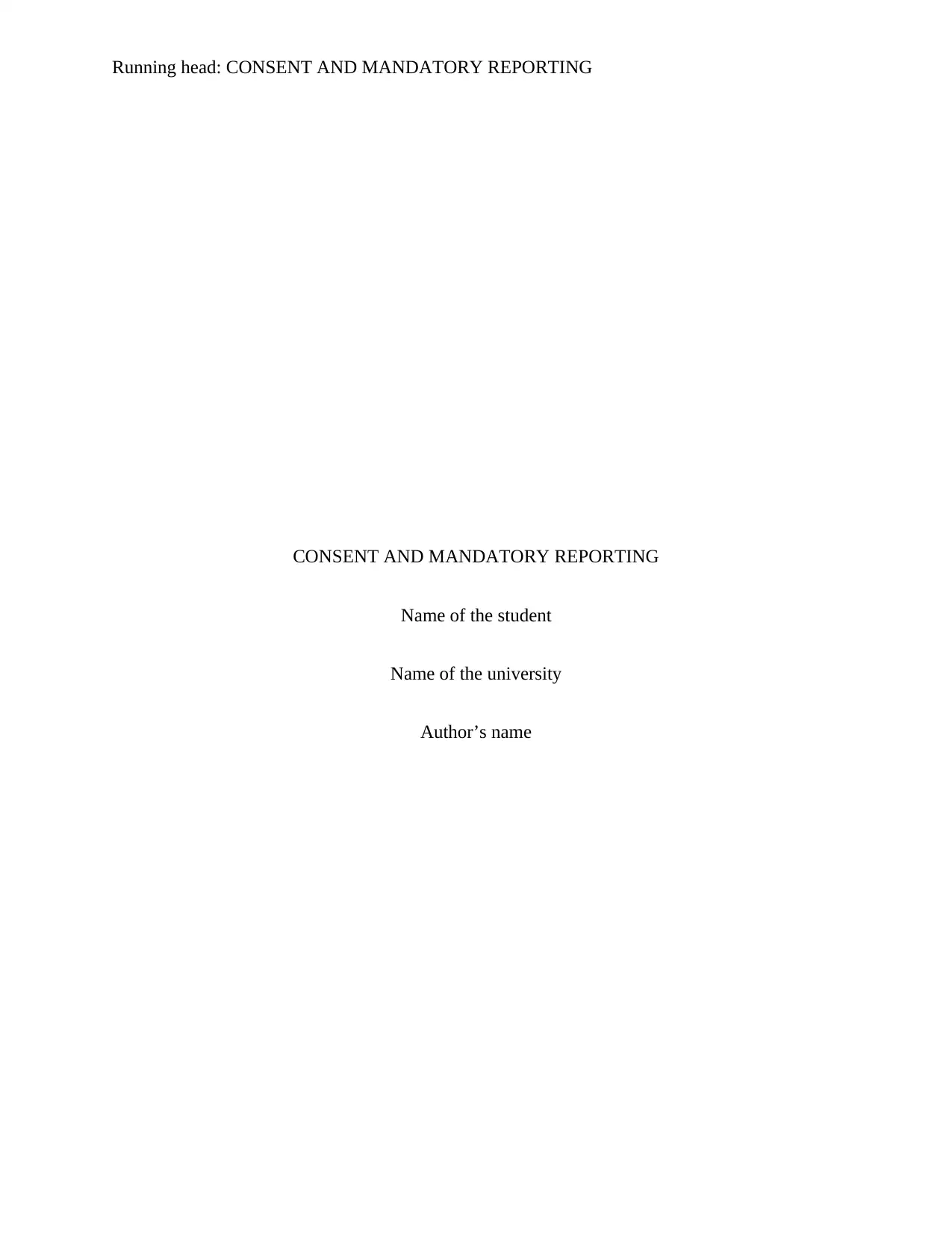
Running head: CONSENT AND MANDATORY REPORTING
CONSENT AND MANDATORY REPORTING
Name of the student
Name of the university
Author’s name
CONSENT AND MANDATORY REPORTING
Name of the student
Name of the university
Author’s name
Paraphrase This Document
Need a fresh take? Get an instant paraphrase of this document with our AI Paraphraser
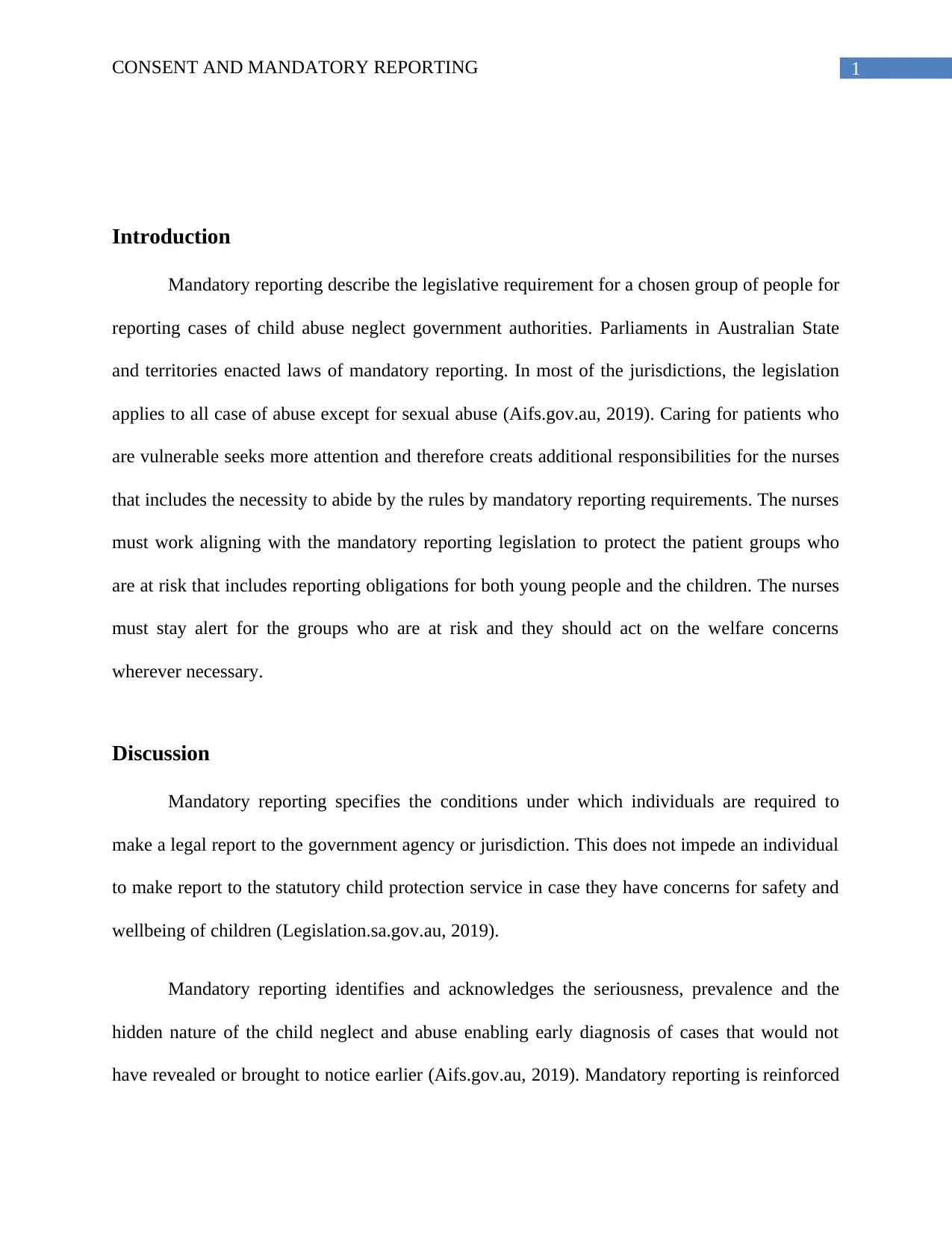
1CONSENT AND MANDATORY REPORTING
Introduction
Mandatory reporting describe the legislative requirement for a chosen group of people for
reporting cases of child abuse neglect government authorities. Parliaments in Australian State
and territories enacted laws of mandatory reporting. In most of the jurisdictions, the legislation
applies to all case of abuse except for sexual abuse (Aifs.gov.au, 2019). Caring for patients who
are vulnerable seeks more attention and therefore creats additional responsibilities for the nurses
that includes the necessity to abide by the rules by mandatory reporting requirements. The nurses
must work aligning with the mandatory reporting legislation to protect the patient groups who
are at risk that includes reporting obligations for both young people and the children. The nurses
must stay alert for the groups who are at risk and they should act on the welfare concerns
wherever necessary.
Discussion
Mandatory reporting specifies the conditions under which individuals are required to
make a legal report to the government agency or jurisdiction. This does not impede an individual
to make report to the statutory child protection service in case they have concerns for safety and
wellbeing of children (Legislation.sa.gov.au, 2019).
Mandatory reporting identifies and acknowledges the seriousness, prevalence and the
hidden nature of the child neglect and abuse enabling early diagnosis of cases that would not
have revealed or brought to notice earlier (Aifs.gov.au, 2019). Mandatory reporting is reinforced
Introduction
Mandatory reporting describe the legislative requirement for a chosen group of people for
reporting cases of child abuse neglect government authorities. Parliaments in Australian State
and territories enacted laws of mandatory reporting. In most of the jurisdictions, the legislation
applies to all case of abuse except for sexual abuse (Aifs.gov.au, 2019). Caring for patients who
are vulnerable seeks more attention and therefore creats additional responsibilities for the nurses
that includes the necessity to abide by the rules by mandatory reporting requirements. The nurses
must work aligning with the mandatory reporting legislation to protect the patient groups who
are at risk that includes reporting obligations for both young people and the children. The nurses
must stay alert for the groups who are at risk and they should act on the welfare concerns
wherever necessary.
Discussion
Mandatory reporting specifies the conditions under which individuals are required to
make a legal report to the government agency or jurisdiction. This does not impede an individual
to make report to the statutory child protection service in case they have concerns for safety and
wellbeing of children (Legislation.sa.gov.au, 2019).
Mandatory reporting identifies and acknowledges the seriousness, prevalence and the
hidden nature of the child neglect and abuse enabling early diagnosis of cases that would not
have revealed or brought to notice earlier (Aifs.gov.au, 2019). Mandatory reporting is reinforced
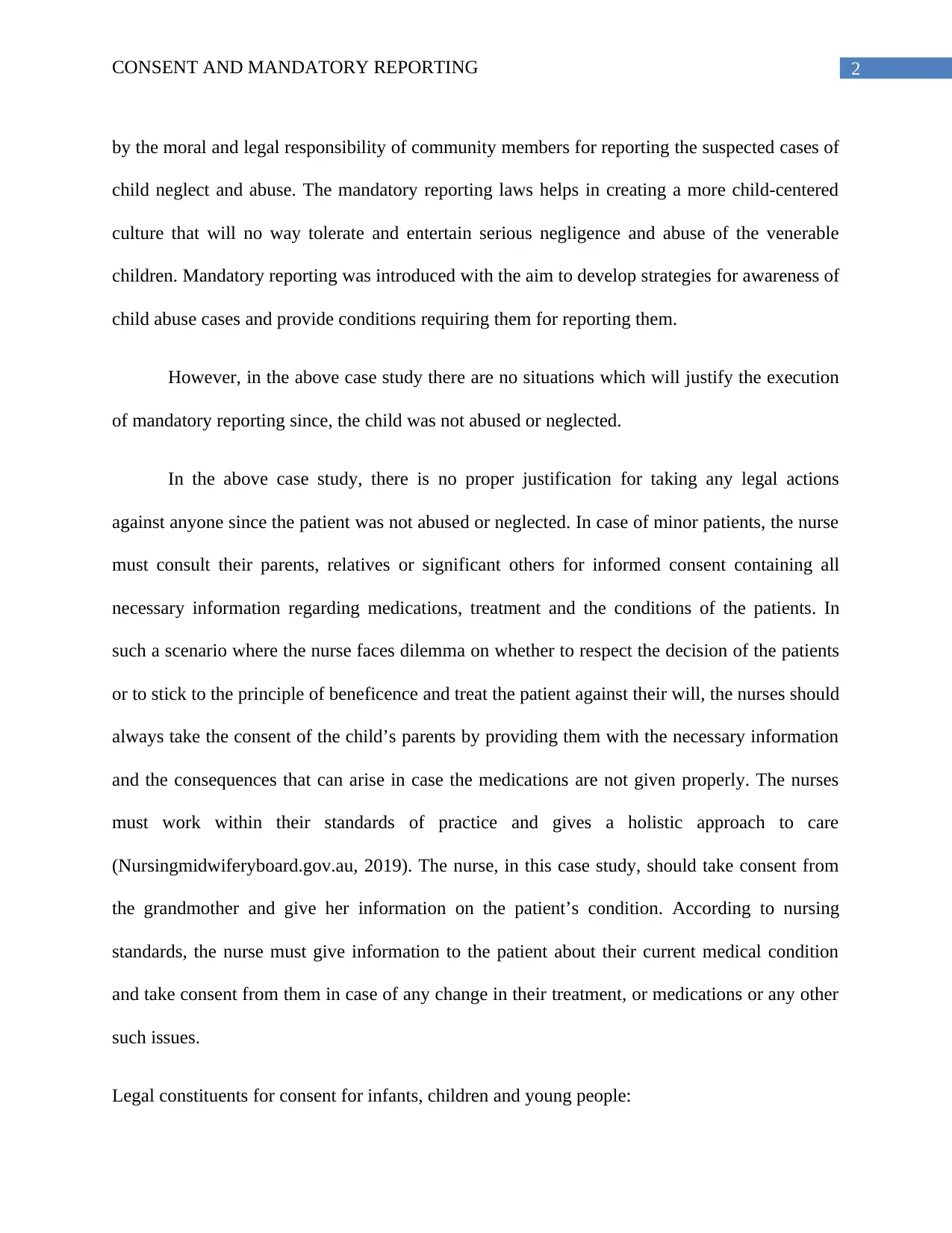
2CONSENT AND MANDATORY REPORTING
by the moral and legal responsibility of community members for reporting the suspected cases of
child neglect and abuse. The mandatory reporting laws helps in creating a more child-centered
culture that will no way tolerate and entertain serious negligence and abuse of the venerable
children. Mandatory reporting was introduced with the aim to develop strategies for awareness of
child abuse cases and provide conditions requiring them for reporting them.
However, in the above case study there are no situations which will justify the execution
of mandatory reporting since, the child was not abused or neglected.
In the above case study, there is no proper justification for taking any legal actions
against anyone since the patient was not abused or neglected. In case of minor patients, the nurse
must consult their parents, relatives or significant others for informed consent containing all
necessary information regarding medications, treatment and the conditions of the patients. In
such a scenario where the nurse faces dilemma on whether to respect the decision of the patients
or to stick to the principle of beneficence and treat the patient against their will, the nurses should
always take the consent of the child’s parents by providing them with the necessary information
and the consequences that can arise in case the medications are not given properly. The nurses
must work within their standards of practice and gives a holistic approach to care
(Nursingmidwiferyboard.gov.au, 2019). The nurse, in this case study, should take consent from
the grandmother and give her information on the patient’s condition. According to nursing
standards, the nurse must give information to the patient about their current medical condition
and take consent from them in case of any change in their treatment, or medications or any other
such issues.
Legal constituents for consent for infants, children and young people:
by the moral and legal responsibility of community members for reporting the suspected cases of
child neglect and abuse. The mandatory reporting laws helps in creating a more child-centered
culture that will no way tolerate and entertain serious negligence and abuse of the venerable
children. Mandatory reporting was introduced with the aim to develop strategies for awareness of
child abuse cases and provide conditions requiring them for reporting them.
However, in the above case study there are no situations which will justify the execution
of mandatory reporting since, the child was not abused or neglected.
In the above case study, there is no proper justification for taking any legal actions
against anyone since the patient was not abused or neglected. In case of minor patients, the nurse
must consult their parents, relatives or significant others for informed consent containing all
necessary information regarding medications, treatment and the conditions of the patients. In
such a scenario where the nurse faces dilemma on whether to respect the decision of the patients
or to stick to the principle of beneficence and treat the patient against their will, the nurses should
always take the consent of the child’s parents by providing them with the necessary information
and the consequences that can arise in case the medications are not given properly. The nurses
must work within their standards of practice and gives a holistic approach to care
(Nursingmidwiferyboard.gov.au, 2019). The nurse, in this case study, should take consent from
the grandmother and give her information on the patient’s condition. According to nursing
standards, the nurse must give information to the patient about their current medical condition
and take consent from them in case of any change in their treatment, or medications or any other
such issues.
Legal constituents for consent for infants, children and young people:
⊘ This is a preview!⊘
Do you want full access?
Subscribe today to unlock all pages.

Trusted by 1+ million students worldwide
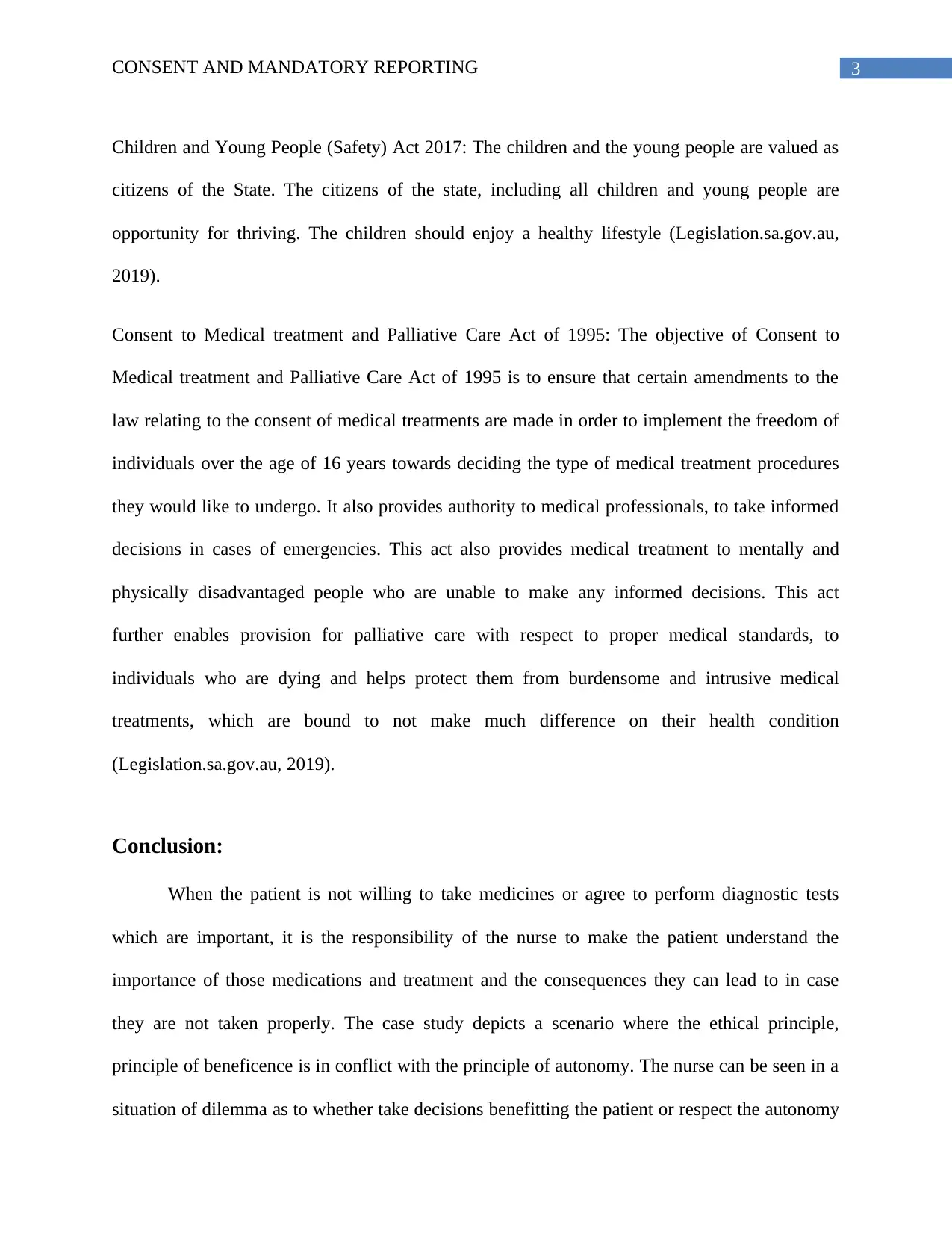
3CONSENT AND MANDATORY REPORTING
Children and Young People (Safety) Act 2017: The children and the young people are valued as
citizens of the State. The citizens of the state, including all children and young people are
opportunity for thriving. The children should enjoy a healthy lifestyle (Legislation.sa.gov.au,
2019).
Consent to Medical treatment and Palliative Care Act of 1995: The objective of Consent to
Medical treatment and Palliative Care Act of 1995 is to ensure that certain amendments to the
law relating to the consent of medical treatments are made in order to implement the freedom of
individuals over the age of 16 years towards deciding the type of medical treatment procedures
they would like to undergo. It also provides authority to medical professionals, to take informed
decisions in cases of emergencies. This act also provides medical treatment to mentally and
physically disadvantaged people who are unable to make any informed decisions. This act
further enables provision for palliative care with respect to proper medical standards, to
individuals who are dying and helps protect them from burdensome and intrusive medical
treatments, which are bound to not make much difference on their health condition
(Legislation.sa.gov.au, 2019).
Conclusion:
When the patient is not willing to take medicines or agree to perform diagnostic tests
which are important, it is the responsibility of the nurse to make the patient understand the
importance of those medications and treatment and the consequences they can lead to in case
they are not taken properly. The case study depicts a scenario where the ethical principle,
principle of beneficence is in conflict with the principle of autonomy. The nurse can be seen in a
situation of dilemma as to whether take decisions benefitting the patient or respect the autonomy
Children and Young People (Safety) Act 2017: The children and the young people are valued as
citizens of the State. The citizens of the state, including all children and young people are
opportunity for thriving. The children should enjoy a healthy lifestyle (Legislation.sa.gov.au,
2019).
Consent to Medical treatment and Palliative Care Act of 1995: The objective of Consent to
Medical treatment and Palliative Care Act of 1995 is to ensure that certain amendments to the
law relating to the consent of medical treatments are made in order to implement the freedom of
individuals over the age of 16 years towards deciding the type of medical treatment procedures
they would like to undergo. It also provides authority to medical professionals, to take informed
decisions in cases of emergencies. This act also provides medical treatment to mentally and
physically disadvantaged people who are unable to make any informed decisions. This act
further enables provision for palliative care with respect to proper medical standards, to
individuals who are dying and helps protect them from burdensome and intrusive medical
treatments, which are bound to not make much difference on their health condition
(Legislation.sa.gov.au, 2019).
Conclusion:
When the patient is not willing to take medicines or agree to perform diagnostic tests
which are important, it is the responsibility of the nurse to make the patient understand the
importance of those medications and treatment and the consequences they can lead to in case
they are not taken properly. The case study depicts a scenario where the ethical principle,
principle of beneficence is in conflict with the principle of autonomy. The nurse can be seen in a
situation of dilemma as to whether take decisions benefitting the patient or respect the autonomy
Paraphrase This Document
Need a fresh take? Get an instant paraphrase of this document with our AI Paraphraser
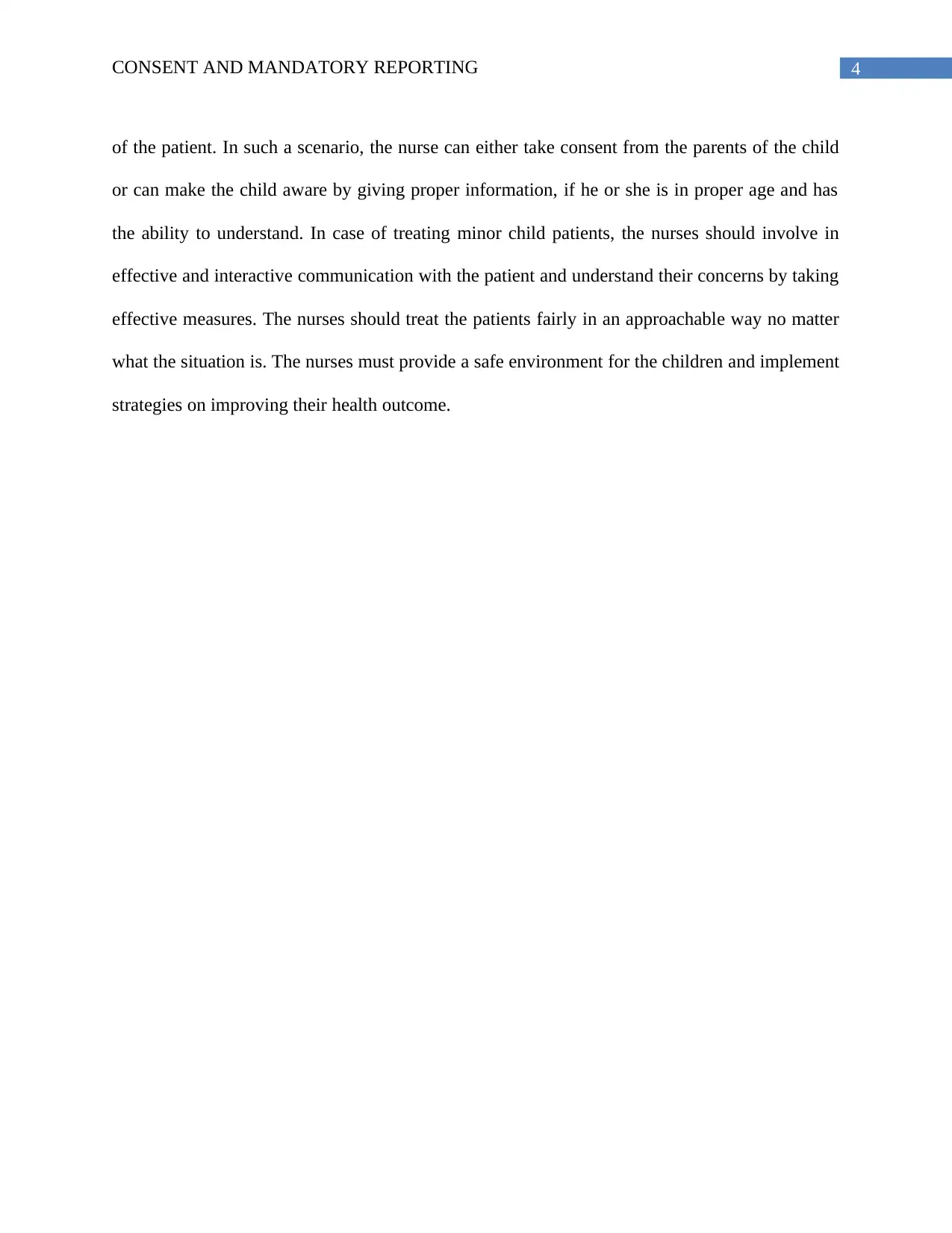
4CONSENT AND MANDATORY REPORTING
of the patient. In such a scenario, the nurse can either take consent from the parents of the child
or can make the child aware by giving proper information, if he or she is in proper age and has
the ability to understand. In case of treating minor child patients, the nurses should involve in
effective and interactive communication with the patient and understand their concerns by taking
effective measures. The nurses should treat the patients fairly in an approachable way no matter
what the situation is. The nurses must provide a safe environment for the children and implement
strategies on improving their health outcome.
of the patient. In such a scenario, the nurse can either take consent from the parents of the child
or can make the child aware by giving proper information, if he or she is in proper age and has
the ability to understand. In case of treating minor child patients, the nurses should involve in
effective and interactive communication with the patient and understand their concerns by taking
effective measures. The nurses should treat the patients fairly in an approachable way no matter
what the situation is. The nurses must provide a safe environment for the children and implement
strategies on improving their health outcome.
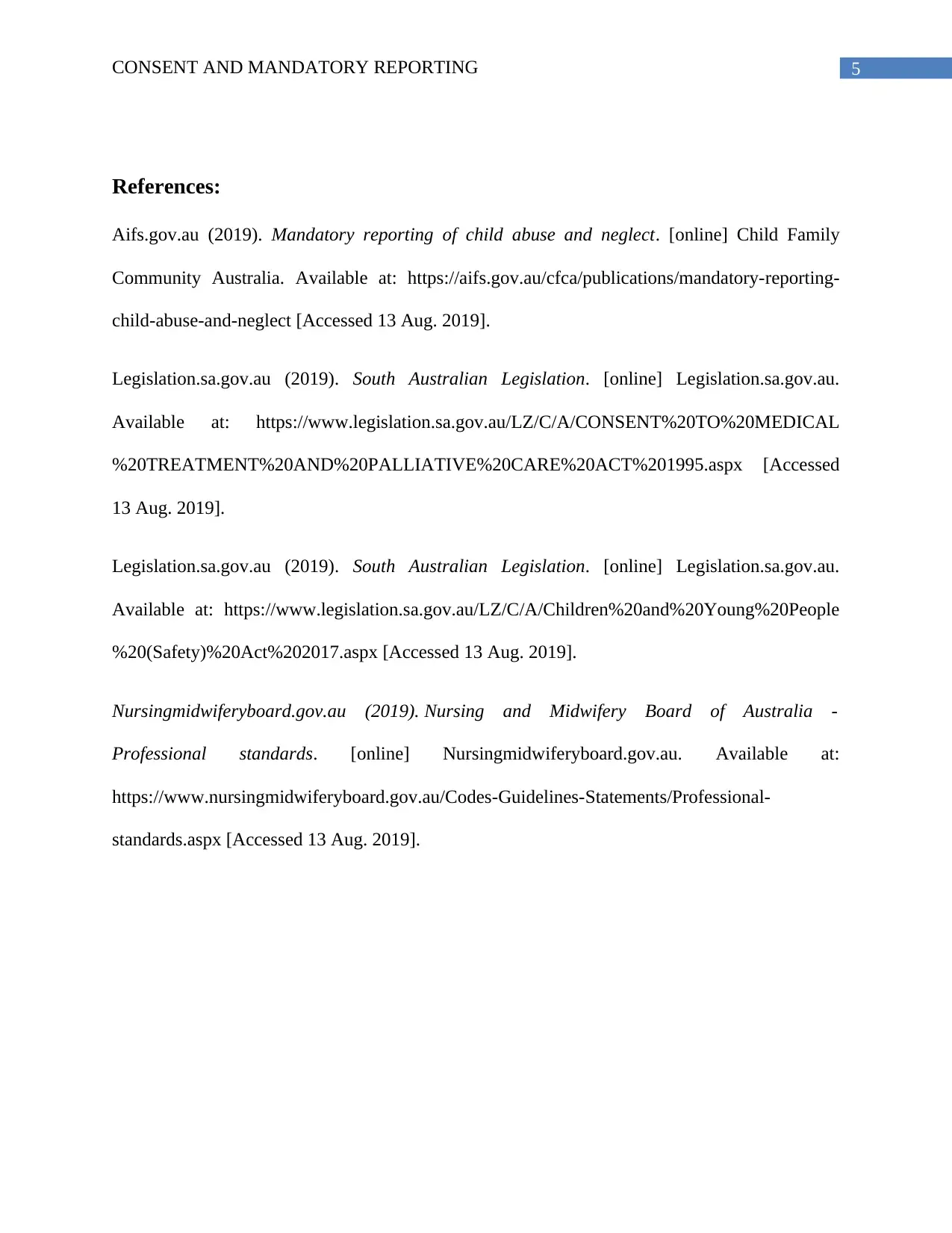
5CONSENT AND MANDATORY REPORTING
References:
Aifs.gov.au (2019). Mandatory reporting of child abuse and neglect. [online] Child Family
Community Australia. Available at: https://aifs.gov.au/cfca/publications/mandatory-reporting-
child-abuse-and-neglect [Accessed 13 Aug. 2019].
Legislation.sa.gov.au (2019). South Australian Legislation. [online] Legislation.sa.gov.au.
Available at: https://www.legislation.sa.gov.au/LZ/C/A/CONSENT%20TO%20MEDICAL
%20TREATMENT%20AND%20PALLIATIVE%20CARE%20ACT%201995.aspx [Accessed
13 Aug. 2019].
Legislation.sa.gov.au (2019). South Australian Legislation. [online] Legislation.sa.gov.au.
Available at: https://www.legislation.sa.gov.au/LZ/C/A/Children%20and%20Young%20People
%20(Safety)%20Act%202017.aspx [Accessed 13 Aug. 2019].
Nursingmidwiferyboard.gov.au (2019). Nursing and Midwifery Board of Australia -
Professional standards. [online] Nursingmidwiferyboard.gov.au. Available at:
https://www.nursingmidwiferyboard.gov.au/Codes-Guidelines-Statements/Professional-
standards.aspx [Accessed 13 Aug. 2019].
References:
Aifs.gov.au (2019). Mandatory reporting of child abuse and neglect. [online] Child Family
Community Australia. Available at: https://aifs.gov.au/cfca/publications/mandatory-reporting-
child-abuse-and-neglect [Accessed 13 Aug. 2019].
Legislation.sa.gov.au (2019). South Australian Legislation. [online] Legislation.sa.gov.au.
Available at: https://www.legislation.sa.gov.au/LZ/C/A/CONSENT%20TO%20MEDICAL
%20TREATMENT%20AND%20PALLIATIVE%20CARE%20ACT%201995.aspx [Accessed
13 Aug. 2019].
Legislation.sa.gov.au (2019). South Australian Legislation. [online] Legislation.sa.gov.au.
Available at: https://www.legislation.sa.gov.au/LZ/C/A/Children%20and%20Young%20People
%20(Safety)%20Act%202017.aspx [Accessed 13 Aug. 2019].
Nursingmidwiferyboard.gov.au (2019). Nursing and Midwifery Board of Australia -
Professional standards. [online] Nursingmidwiferyboard.gov.au. Available at:
https://www.nursingmidwiferyboard.gov.au/Codes-Guidelines-Statements/Professional-
standards.aspx [Accessed 13 Aug. 2019].
⊘ This is a preview!⊘
Do you want full access?
Subscribe today to unlock all pages.

Trusted by 1+ million students worldwide
1 out of 6
Related Documents
Your All-in-One AI-Powered Toolkit for Academic Success.
+13062052269
info@desklib.com
Available 24*7 on WhatsApp / Email
![[object Object]](/_next/static/media/star-bottom.7253800d.svg)
Unlock your academic potential
Copyright © 2020–2026 A2Z Services. All Rights Reserved. Developed and managed by ZUCOL.





